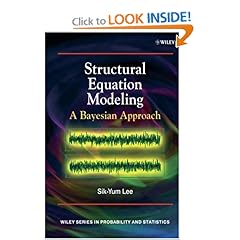
Editorial ReviewsReview
"This book is a welcome addition to any library and should be a valuable resource for research and teaching." (Technometrics, August 2008)
Product Description
Structural equation modeling (SEM) is a powerful multivariate method allowing the evaluation of a series of simultaneous hypotheses about the impacts of latent and manifest variables on other variables, taking measurement errors into account. As SEMs have grown in popularity in recent years, new models and statistical methods have been developed for more accurate analysis of more complex data. A Bayesian approach to SEMs allows the use of prior information resulting in improved parameter estimates, latent variable estimates, and statistics for model comparison, as well as offering more reliable results for smaller samples. Structural Equation Modeling introduces the Bayesian approach to SEMs, including the selection of prior distributions and data augmentation, and offers an overview of the subject’s recent advances.
- Demonstrates how to utilize powerful statistical computing tools, including the Gibbs sampler, the Metropolis-Hasting algorithm, bridge sampling and path sampling to obtain the Bayesian results.
- Discusses the Bayes factor and Deviance Information Criterion (DIC) for model comparison.
- Includes coverage of complex models, including SEMs with ordered categorical variables, and dichotomous variables, nonlinear SEMs, two-level SEMs, multisample SEMs, mixtures of SEMs, SEMs with missing data, SEMs with variables from an exponential family of distributions, and some of their combinations.
- Illustrates the methodology through simulation studies and examples with real data from business management, education, psychology, public health and sociology.
- Demonstrates the application of the freely available software WinBUGS via a supplementary website featuring computer code and data sets.
Product Details
|









 雷達(dá)卡
雷達(dá)卡






 提升卡
提升卡 置頂卡
置頂卡 沉默卡
沉默卡 變色卡
變色卡 搶沙發(fā)
搶沙發(fā) 千斤頂
千斤頂 顯身卡
顯身卡







 京公網(wǎng)安備 11010802022788號
京公網(wǎng)安備 11010802022788號







